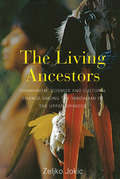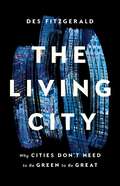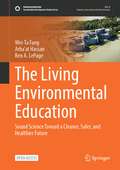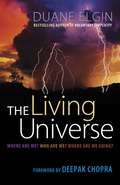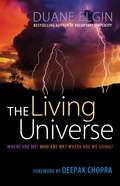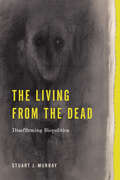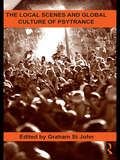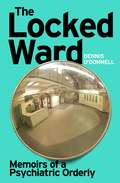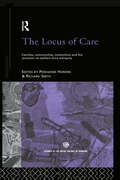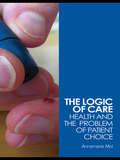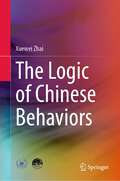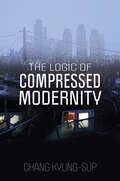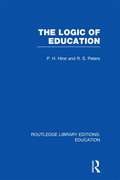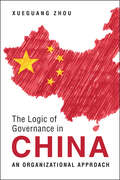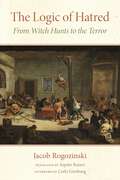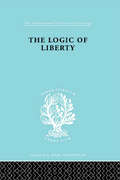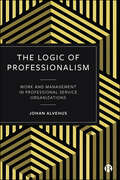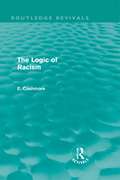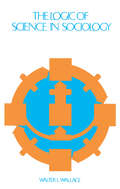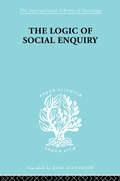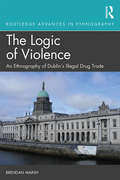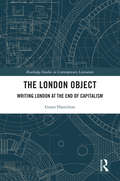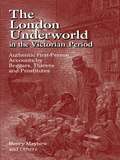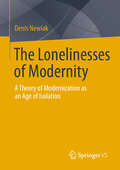- Table View
- List View
The Living Ancestors: Shamanism, Cosmos and Cultural Change among the Yanomami of the Upper Orinoco
by Zeljko JokicThis phenomenologically oriented ethnography focuses on experiential aspects of Yanomami shamanism, including shamanistic activities in the context of cultural change. The author interweaves ethnographic material with theoretical components of a holographic principle, or the idea that the “part is equal to the whole,” which is embedded in the nature of the Yanomami macrocosm, human dwelling, multiple-soul components, and shamans’ relationships with embodied spirit-helpers. This book fills an important gap in the regional study of Yanomami people, and, on a broader scale, enriches understanding of this ancient phenomenon by focusing on the consciousness involved in shamanism through firsthand experiential involvement.
The Living City: Why Cities Don't Need to Be Green to Be Great
by Des FitzgeraldA sociologist explores why &“green cities&” won&’t fix everything—and urges us to celebrate urban life as it is Everywhere you look, cities are getting greener. The general assumption is clear: if something is unhealthy or bad about urban life today, then nature holds the cure. However, argues sociologist Des Fitzgerald, green spaces are not the panacea that people think. In The Living City, Fitzgerald tours the international green city movement that has flourished across the world and discovers the deep, sometimes troubling, roots of our desire to connect cities to nature. Talking to policy makers, planners, scientists, and architects, Fitzgerald suggests that underneath the wish to turn future cities green is another wish: to make the modern city, and perhaps the modern world, disappear altogether. Ultimately, he makes an argument for celebrating the contemporary city as it is—in all its noisy, constructed, artificial glory.
The Living Environmental Education: Sound Science Toward a Cleaner, Safer, and Healthier Future (Sustainable Development Goals Series)
by Wei-Ta Fang Ben A. LePage Arba'at HassanThis open access book is designed and written to bridge the gap on the critical issues identified in environmental education programs in Asian countries. The world and its environments are changing rapidly, and the public may have difficulty keeping up and understanding how these changes will affect our way of life. The authors discuss various topics and case studies from an Asian perspective, but the content, messaging, and lessons learned need not be limited to Asian cultures. Each chapter provides a summary of the intensive research that has been performed on pro-environmental behaviors, the experience of people working in industry and at home, and their philosophies that guide them in their daily lives. We highlight humanity’s potential to contribute to Sustainable Development Goals (SDGs) by understanding better the environmental psychology, social inclusion, and environmental sustainability and stewardship protection elements that contribute to responsible environmental citizenship. The content of the chapters in this book includes a discussion of the crucial issues, plans, and evaluations for sustainability theories, practices, and actions with a proposed management structure for maximizing the cultural, social, and ecological diversity of Asian experiences compared to other theories and cultures internationally. We intend that the data in this book will provide a comprehensive guide for students, professors, practitioners, and entrepreneurs of environmental education and its related disciplines using case studies that demonstrate the relationship between the social and behavioral sciences and environmental leadership and sustainability.
The Living Universe: Where Are We? Who Are We? Where Are We Going?
by Duane ElginIn The Living Universe, Duane Elgin marshals evidence from cosmology, biology, physics, even his participation in NASA-sponsored psychic experiments to show that the universe is actually a living field of existence and that we are always in.
The Living Universe: Where Are We? Who Are We? Where Are We Going?
by Duane ElginBy the bestselling author of Voluntary Simplicity (over 150,000 sold)• Brings together cutting-edge science and ancient spiritual wisdom to demonstrate that the universe is a living, sentient system and that we are an integral part of it• Explores the power of this new paradigm to move humanity toward a sustainable and promising futureScience has traditionally regarded the universe as mostly made up mostly of inert matter and empty space. At one time this point of view was liberating, part of the Enlightenment-born rationalism that helped humanity free itself from superstition and fear and achieve extraordinary intellectual and technological breakthroughs. But this paradigm has outlived its usefulness. It has led to rampant materialism and environmental degradation—if the universe is essentially dead and we are alive, then the inanimate stuff of the universe should be ours to exploit. But we now know that not only is the view of a dead universe destructive, it is also inaccurate and misleading.In The Living Universe, Duane Elgin brings together evidence from cosmology, biology, physics, and even his participation in NASA-sponsored psychic experiments to show that the universe is permeated by a living field and that we are always in communion with that field of aliveness whether we are conscious of it or not. This is a world-view that, as Elgin explains, is shared by virtually every spiritual tradition, and the implications of it are vast and deep. In a living system, each part is integral to the whole, so each of us is intimately connected to the entire universe. Elgin eloquently demonstrates how our identity manifests itself on a whole series of levels, from subatomic to galactic. We are, he writes, “far more than biological beings—we are beings of cosmic connection and participation.”To confront our ongoing planetary crisis of dwindling resources and escalating conflict, we need to move past an ideology of separation, competition, and exploitation. Duane Elgin asks us to see humanity sharing in the same field of aliveness, to discover how to live sustainably and harmoniously within the living universe.
The Living Workplace: Soul, Spirit, and Success in the 21st Century
by Ann Coombs Marion E. RaychebaThrough true-life examples and well-tested learning model, the author reveals how to access and utilize the key elements of spirituality such as wisdom, service and creativity, to ensure long-term success. This is a new approach to business.
The Living from the Dead: Disaffirming Biopolitics (RSA Series in Transdisciplinary Rhetoric)
by Stuart J. MurrayIn a society that aims above all to safeguard life, how might we reckon with ethical responsibility when we are complicit in sacrificial economies that produce and tolerate death as a necessity of life?Arguing that biopower can be fully exposed only through an analysis of those whom society has “let die,” Stuart J. Murray employs a series of transdisciplinary case studies to uncover the structural and rhetorical conditions through which biopower works. These case studies include the concept of “sacrifice” in the “war” against COVID-19, where emergent cultures of pandemic “resistance” are explored alongside suicide bombings and military suicides; the California mass hunger strikes of 2013; legal cases involving “preventable” and “untimely” childhood deaths, exposing the irreconcilable claims of anti-vaxxers and Indigenous peoples; and the videorecording of the death of a disabled Black man. Murray demonstrates that active resistance to biopower inevitably reproduces tropes of “making live” and “letting die.” His counter to this fact is a critical stance of disaffirmation, one in which death disrupts the politics of life itself.A philosophically nuanced critique of biopower, The Living from the Dead is a meditation on life, death, power, language, and control in the twenty-first century. It will appeal to students and scholars of rhetoric, philosophy, and critical theory.
The Local Scenes and Global Culture of Psytrance (Routledge Studies In Ethnomusicology Ser. #2)
by Graham St JohnThis lively textual symposium offers a collection of formative research on the culture of global psytrance (psychedelic trance). As the first book to address the diverse transnationalism of this contemporary electronic dance music phenomenon, the collection hosts interdisciplinary research addressing psytrance as a product of intersecting local and global trajectories. Contributing to theories of globalization, postmodernism, counterculture, youth subcultures, neotribes, the carnivalesque, music scenes and technologies, dance ritual and spirituality, chapters introduce psytrance in Goa, the UK, Israel, Japan, the US, Italy, Czech Republic, Portugal and Australia. As a global occurrence indebted to 1960s psychedelia, sharing music production technologies and DJ techniques with electronic dance music scenes, and harnessing the communication capabilities of the Internet, psytrance and its cultural implications are thoroughly discussed in this first scholarly volume of its kind.
The Locked Ward: A humane and revealing account of life on the frontlines of mental health care.
by Dennis O'DonnellAn extraordinary account of life behind the locked doors of a secure psychiatric ward from a nurse who worked there for seven years. Dennis O'Donnell started work as an orderly in the Intensive Psychiatric Care Unit of a large hospital in Scotland in 2000. In his daily life he encountered fear, violence and despair but also a considerable amount of care and compassion. Recounting the stories of the patients he worked with, and those of his colleagues on the ward, here he examines major mental health conditions, methods of treatment - medication, how religion, sex, wealth, health and drugs can bear influence on mental health, the prevailing attitudes to psychiatric illness, the authorities, the professionals & society. What emerges is a document of humanity and humour, a remarkable memoir that sheds light on a world that still remains largely unknown. 'This is a superb study of people whose minds have gone wrong, and the art of caring for them' Evening Standard
The Locus of Care: Families, Communities, Institutions, and the Provision of Welfare Since Antiquity (Routledge Studies in the Social History of Medicine)
by Peregrine Horden and Richard SmithThe care of the needy and the sick is delivered by various groups including immediate family, the wider community, religious organisations and the State funded institutions. The Locus of Care provides an historical perspective on welfare detailing who carers were in the past, where care was provided, and how far the boundary between family and state or informal and organised institutions have changed over time. Eleven international contributors provide a wide-ranging examination of themes, such as child care, mental health, and provision for the elderly and question the idea that there has been a recent evolutionary shift from informal provision to institutional care. Chapters on Europe and England use case studies and link evidence from ancient and medieval periods to contemporary problems and the recent past, whilst studies on China and South Africa look to the future of welfare throughout the world. By placing welfare in its historical, social, cultural and demographic contexts, Locus of Care reassesses community and institutional care and the future expectations of welfare provision.
The Logic of Care: Health and the Problem of Patient Choice
by Annemarie Mol**Shortlisted for the BSA Sociology of Health and Illness Book Prize 2010**What is good care? In this innovative and compelling book, Annemarie Mol argues that good care has little to do with 'patient choice' and, therefore, creating more opportunities for patient choice will not improve health care. Although it is possible to treat people who seek professional help as customers or citizens, Mol argues that this undermines ways of thinking and acting crucial to health care. Illustrating the discussion with examples from diabetes clinics and diabetes self care, the book presents the 'logic of care' in a step by step contrast with the 'logic of choice'. She concludes that good care is not a matter of making well argued individual choices but is something that grows out of collaborative and continuing attempts to attune knowledge and technologies to diseased bodies and complex lives. Mol does not criticise the practices she encountered in her field work as messy or ad hoc, but makes explicit what it is that motivates them: an intriguing combination of adaptability and perseverance. The Logic of Care: Health and the problem of patient choice is crucial reading for all those interested in the theory and practice of care, including sociologists, anthropologists and health care professionals. It will also speak to policymakers and become a valuable source of inspiration for patient activists.
The Logic of Chinese Behaviors
by Xuewei ZhaiThis book presents a discussion on Chinese people’s internal and external psychologies and logics, as well as the respective stage of social development and cultural context they were raised in, and from sociological, social psychological, and cultural anthropological perspectives. In particular, the book explores the relationship between Chinese people’s behaviors and China’s social and cultural structure. It puts forward a theoretical framework for the analysis of Chinese social behaviors, which is based on the realistic aspects of Chinese people’s day-to-day-lives. The book also concludes that any attempt to study Chinese psychologies and behaviors should “seek the constant among the changes, or at least those aspects that are hardest to change” and investigate the context and background, which can provide a point of departure for current and future research.
The Logic of Compressed Modernity
by Chang Kyung-SupMost theories of modernity are based, explicitly or implicitly, on the development of Western societies since the late medieval period, but these theories are of limited value for understanding the development of societies in Asia and other parts of the world, where the process of modernization took place under different circumstances and often in a rapid and highly compressed fashion – not over centuries but in decades. Asian societies have been propelled into modernity too, but theirs is a compressed modernity, which displays very different traits. In this important book, Chang Kyung-Sup provides a systematic account of this compressed modernity and uses it to analyse the extreme social changes, complexities and imbalances found in South Korea and other East Asian societies. While these changes enabled South Korea to modernize very quickly and achieve high levels of economic growth, they also created a society that is haunted by various developmental and civilizational costs, such as endemic generational conflicts, overloaded family responsibilities and exceptionally high suicide rates. As with other societies that have experienced compressed modernity, the South Korean “miracle” is replete with extreme and contradictory social traits. This pioneering work of the nature and consequences of compressed modernity will be of great interest to students and scholars of sociology, politics and development studies, as well as anyone interested in South Korea, Asia and postcolonial societies.
The Logic of Education (Routledge Library Editions: Education)
by P. H. Hirst and R. S. PetersThis book explores the implications for the curriculum, for teaching and for the authority structure of schools and colleges of an analysis of ‘education’ in which the development of knowledge and understanding is accorded a central position. The book explains what philosophy of education is, and by concentrating on its central concepts, initiates readers into exploring it for themselves. It also serves as a succinct introduction to the growing literature on philosophy of education in the UK.
The Logic of Governance in China The Logic of Governance in China: An Organizational Approach
by Xueguang ZhouDrawing on more than a decade of fieldwork, The Logic of Governance in China develops a unified theoretical framework to explain how China's centralized political system maintains governance and how this process produces recognizable policy cycles that are obstacles to bureaucratic rationalization, professionalism, and rule of law. The book is unique for the overarching framework it develops; one that sheds light on the interconnectedness among apparently disparate phenomena such as the mobilizational state, bureaucratic muddling through, collusive behaviors, variable coupling between policymaking and implementation, inverted soft budget constraints, and collective action based on unorganized interests. An exemplary combination of theory-motivated fieldwork and empirically-informed theory development, this book offers an in-depth analysis of the institutions and mechanisms in the governance of China.
The Logic of Hatred: From Witch Hunts to the Terror
by Jacob RogozinskiThis book works to uncover the logic of hatred, to understand how this affect manifests itself historically in persecution and terror apparatuses. More than a historical genealogy of persecution, The Logic of Hatred shows what phenomenology can offer to historical understanding. Focusing on the witch-hunts waged in the fifteenth through seventeenth centuries, the first part of the book analyzes the techniques instigators used to designate and annihilate their targets: the search for diabolical stigma, the confession of “truth” extracted by torture, the constitution of an absolute Enemy through the suggestion of conspiracy, of a world turned upside-down, or the figure of Satan.Rogozinski locates one of the origins of the witch-hunt in the anguish that popular uprisings arouse in dominant classes. The second part of the book extends the investigation to related phenomena, such as the extermination of lepers in the Middle Ages and the Reign of Terror during the French Revolution. By studying these historical experiences and marking their differences and similarities, this book shows the passage from exclusion to persecution and how revolts of the oppressed can let themselves be transformed and captured by persecutory politics. The analyses presented thus shed light on conspiracy theory and the terror apparatuses of our time.
The Logic of Liberty: Reflections and Rejoinders (International Library of Sociology)
by Michael PolanyiThis is Volume XI of eighteen in the Political Sociology Series and looks at the rejections and rejoinders of the logic of liberty, originally published in 1951.
The Logic of Professionalism: Work and Management in Professional Service Organizations
by Johan AlvehusThis book discusses common management and work practices in professional service organizations. Alvehus opens important discussions on what it means to work, manage, and be managed in such professional organizations, casting light on classic conflicts. He takes everyday work as a starting point and adopts a critical view that focuses on challenges and struggles in both public and private settings. He offers new perspectives and key insights for the future of professionalism. Providing a comprehensive overview of the field, this book is an important guide for understanding how professionalism is maintained in today’s organizations. It will be essential reading for students and scholars of management and leadership.
The Logic of Racism (Routledge Revivals)
by E. CashmoreFirst published in 1987, The Logic of Racism provides a portrait of race relations based on the stories of 800 different individuals from all sections of society. In this book, voices from the author’s tape recorder are converted to the page for the reader to experience the vivid, sometimes humorous and frequently disturbing impressions of race relations as they are experienced. Interviewees include people from different age groups, sexes, races, and social backgrounds as well as the politicians, teachers and professionals responsible for fighting racism. The book combines real life experiences with the author’s analysis and the result is a text that focuses on the reasoning behind prejudice and its resistance to rational argument.
The Logic of Science in Sociology
by Walter WallaceThe subject of this book is limited to the abstract form or "logic" of science, as applied particularly to scientific sociology. But the discussion presented here goes beyond abstraction and serves a practical role in the sociology and history of science by providing a framework for reducing the enormous variety of scientific researches-both within a given field and across all fields-to a limited number of interrelated formal elements. Such a framework may prove useful in assessing empirical relationships between the formal aspects of scientific work and its substantive social, economic, political, and historical aspects. This is a work of synthesis that merits close attention. It provides an area for viewing theory as something more than a review of the history of any single social science discipline.
The Logic of Social Enquiry (International Library of Sociology)
by Quentin GibsonThis comprehensive set introduces the fundamental principles of Sociology as propounded by such great figures as Gerth and Mills, Schlesinger, and Homans. Containing classic works of social theory and empirical research, volumes in this set bring together the British, European and American traditions. The whole body of sociological theory is presented in such a way that is valuable and accessible to both students and teachers of Sociology, Political Theory and Geography.
The Logic of Violence: An Ethnography of Dublin's Illegal Drug Trade (Routledge Advances in Ethnography)
by Brendan MarshViolence is widely associated with illegal drug markets, and is one of the features that can differentiate illegal capitalism from legitimate business. This book explores the perceived causes and functions of violence in an illegal drug market in Dublin City, Ireland. Understanding why violence occurs amongst participants in illegal drug markets is an ongoing part of the criminological endeavour. Scholars debate the various business and personal factors that contribute towards violent perpetration. Complex aspects of participants’ lives, such as addictive disorders, socioeconomic status, and socialisation, add further complexity. This book examines violence in an illegal drug market from the perspectives of those who had participated in it, that is, formerly addicted people as well as former profit-oriented drug dealers. The text is the result of the first ethnographic study of an illegal drug market in Dublin. This book will appeal to undergraduate and postgraduate students, as well as scholars interested in the criminology and psychology of violence. More specifically, the book will be relevant to those interested in the areas of illegal drug markets, gang studies, the intersection of drugs and crime, and desistance from crime.
The London Object: Writing London at the End of Capitalism (Routledge Studies in Contemporary Literature)
by Grant HamiltonÉtienne Balibar writes that today we are at the end of capitalism. This is not because capitalism has run its course or has met an irresistible force, but because there can be no purer form of capitalism than the one we have today. Taking seriously the idea that this strain of capitalism has not only seized the urban environment but is the urban environment, works by Michael Moorcock, Iain Sinclair, Penelope Lively, Peter Ackroyd, and J.G. Ballard are read as representative of a loosely allied group of London writers who have anticipated, critiqued, and offered up various avenues of resistance to the deleterious effects of this most vigorous strain of capitalism. Writing on the city by charting a politics of reconnection to the real that necessarily unsettles the epistemological and ontological ground upon which both modernity and capitalism sit, this stable of writers makes clear the ways in which the sheer materiality of the urban environment profoundly influences the being and thinking of individuals. In so doing, these writers produce works which when read together give the coordinates of an altermodernity that might just allow capitalism to reach its final conclusion.
The London Underworld in the Victorian Period: Authentic First-Person Accounts by Beggars, Thieves and Prostitutes
by Henry MayhewThe first and possibly the greatest sociological study of poverty in 19th-century London, this survey by a journalist invented the genre of oral history a century before the term was coined. Henry Mayhew vowed "to publish the history of a people, from the lips of the people themselves — giving a literal description of their labour, their earnings, their trials and their sufferings, in their own 'unvarnished' language." With his collaborators, Mayhew explored hundreds of miles of London streets in the 1840s and 1850s, gathering thousands of pages of testimony from the city's humbler residents. Their stories revealed aspects of city life virtually unknown to literate society.A sprawling, four-volume history resulted from Mayhew's investigations. This extract focuses on the criminal class--pickpockets, prostitutes, rag pickers, and vagrants, whose true stories of degradation, horror, and desperation rival Dickensian fiction. A classic reference source for sociologists, historians, and criminologists, Mayhew's work is immensely readable. As Thackeray wrote, these urban vignettes conjure up "a picture of human life so wonderful, so awful, so piteous and pathetic, so exciting and terrible, that readers of romances own they never read anything like to it."
The Lonelinesses of Modernity: A Theory of Modernization as an Age of Isolation
by Denis NewiakModernity presents itself as an age of increasing social disintegration: secularization and rationalization, urbanization and globalization, individualization and digitalization make it difficult for communities today. Modernity comes with desirable promises that make it attractive, but it does not come free: Its price is escalating modern loneliness. Denis Newiak tells a cultural history of modernization that, from industrialization to the late-modern network society, produces ever new and harsher experiences of loneliness.
